PDN Committee Members
Anna Kolodziejczak
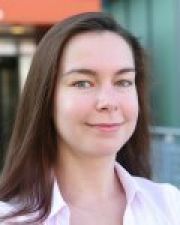
Anna Kolodziejczak
Speaker
Anna Kolodziejczak, born in Poland, started her academic education at Poznan University of Medical Sciences where she studied Biotechnology. Before getting her M.Sc. degree, Anna was awarded the Fulbright foundation scholarship and spent a year at the University of Virginia investigating the role of checkpoint kinases in prostate cancer. This experience sparked her interest in DNA damage repair mechanisms, which turned out to be her main focus during her PhD at DKFZ. After defending her dissertation she joined the ADDRess consortium as a postdoctoral researcher. Her current project is focused on model development for Disorders with Abnormal DNA Damage Response (DADDRs) and drug screening in in-vitro and in-vivo settings. Outside of the lab she practices capoeira (10 years) and enjoys making training for beginners and intermediates as a member of the Brasilianisch-Deutsches Zentrum Heidelberg association.
Fiona Brown-Burke
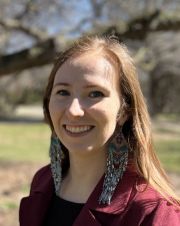
Fiona Brown-Burke
Speaker
Fiona Brown-Burke was born and studied in the USA before moving to Germany in 2023. She recieved her PhD in Biomedical Sciences from the Ohio State University in 2023 with a project focused on novel therapeutics and mouse models for Mantle Cell Lymphoma. Currently she works in the division of Cancer Epigenomics, exploring how epigenetic hetereogeneity influences Acute Myeloid Leukemia. While interested in all things hematology, Fiona plans be involved in scientific policy to advocate for funding and support for researchers. Outside of lab, Fiona loves complex board games, exploring new resturants, and learning about all things Germany. If you are interested in working in the US, please reach out and Fiona would love to share her network and expertise.
Stefania Del Prete
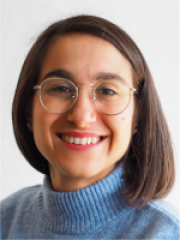
Stefania Del Prete
Stefania was born in Naples and grew up in the North of Italy. She graduated in Molecular Biology at the University of Padova and then moved to Paris after she was awarded a Lifelong Learning Programme scholarship. She obtained a joint doctorate degree from the University of Paris-Saclay and the University of Amsterdam. During her PhD, funded by a Marie Curie fellowship, she focused on understanding gene regulation at the transcriptional and chromatin level in Arabidopsis. She did a first short postdoc at the Wellcome Trust Centre in Edinburgh, unravelling how bivalent chromatin domains, orchestrate the timely activation of genes in mouse embryonic stem cells. Her scientific interests are in the regulation of gene expression by chromatin proteins, impacting different levels of chromatin organization. She is known to invent new words mixing up the different languages she pretends to speak. She is also a foodie and she loves to punch in the air.
Cinthia Amaya Ramirez
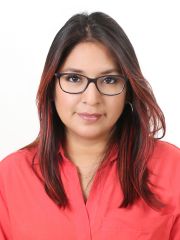
Cinthia Amaya Ramirez
Cinthia was born in Peru, but she grew up in Italy, where she obtained her master degree in Health Biology at the University of Bologna. Afterwards, she won a fellowship to perform an internship in Berlin, at the MDC, in the group of Marina Chekulaeva; where she understood that her next steps must have been in research. She obtained her doctorate degree at the University of Heidelberg, working in the group of Julien Bethune. During her PhD, she focused on finding novel translational regulators factors, using also novel techniques such as Split Bio-ID. Currently, she is in the group of Fabricio Loayza-Puch where she is studying metabolic limitations in breast cancer, mainly applying ribosome profile techniques. She loves to talk to herself, so don't be scared if you find her talking alone. Following her Latino soul, she loves dancing and hears music.
Borja Gomez Ramos
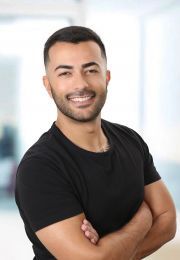
Borja Gomez Ramos
Borja Gomez Ramos is a scientist specializing in investigating how cells maintain their identity and how its loss can lead to diseases such as cancer and neurodegeneration, utilizing transcriptomic and epigenomic methods. He obtained his PhD from the University of Luxembourg and currently serves as a postdoctoral researcher at the DKFZ. In this capacity, he utilizes a range of sophisticated techniques including molecular biology, iPSC, in vivo models, NGS, and bioinformatics to advance his research. Outside of work, he enjoys traveling, sports, and seeking new adventures with friends.
Simon Linder
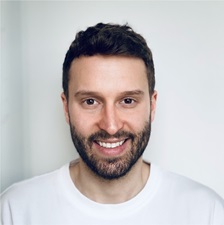
Simon Linder
Simon studied Biomolecular Engineering at the Technical University of Darmstadt and received his PhD in Biomedical Engineering from Eindhoven University of Technology in 2023. He conducted his PhD research at the Netherlands Cancer Institute in Amsterdam, where he focused on improving our current understanding of hormonal signaling in prostate cancer to gain more insights into the cellular adaptation mechanisms that lead to acquired hormone therapy resistance by using integrative multi-omics approaches. In 2023, he was awarded a DKFZ postdoctoral fellowship and joined the division of Translational Medical Oncology. There, he uses integrative epigenomic profiling to unravel novel targetable vulnerabilities in rare cancers. In his spare time, Simon enjoys sports, traveling, spending time with friends and good coffee.
Contact
If you want to contact our PDN commitee, please send your message to the following e-mail address:
